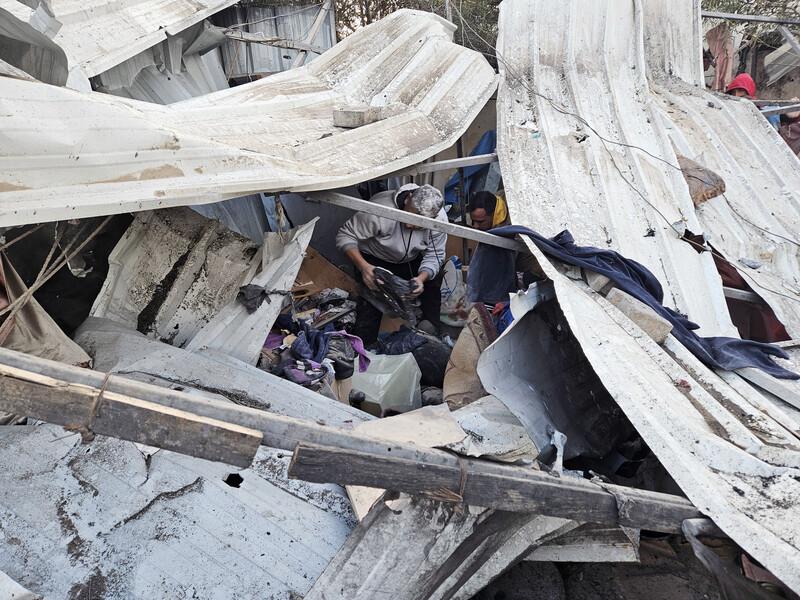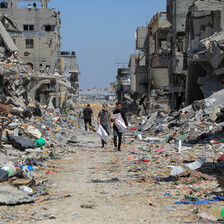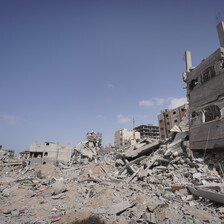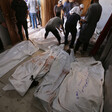The Electronic Intifada 1 January 2025

Palestinians search through the debris after an Israeli attack on al-Mawasi, southern Gaza Strip, that killed 21 Palestinians, including five children, on 5 December 2024.
ActiveStills“Will the borders be opened next week?”
So I was asked by my friend Rozan, who yearns to travel and see her brother who has been outside Gaza for two years, as soon as I got to our workspace. Her eyes glittered as she showed me a Facebook post on her phone repeating an often-heard rumor about the reopening of Rafah crossing on the border with Egypt.
She urged me to answer as I stood silently reading the post and tried to avert my eyes from her beaming smile.
Rozan describes my fact-checking job as “catching the liar.”
Rozan, a UX UI designer whose job is to make websites and apps enjoyable and easy to use, and I, a fact-checker, are freelancers who used to work from home. The war came and turned our comfortable jobs into one of the toughest. Israel imposed a complete siege on the Gaza Strip two days after the outbreak of the war. With sparse electricity and internet, Gaza sank into darkness and we freelancers struggled to continue our work.
After around a year, workspaces catering to freelancers and students started to appear in Gaza, providing the badly needed power and internet that remain unavailable nearly everywhere else.
It has been a year and a half since I started my job as a fact-checker but I have only been able to work for nine months. The siege and the constant need to escape from one place to another because of Israel’s bombing made it impossible for me to work for seven months.
I resumed work as soon as the internet became available again in Khan Younis and began to refute as much as possible the Israeli claims that cost us our lives.
I used to investigate Israeli claims through open sources and using technology tools like reverse image search, advanced search, or, in some cases, image metadata, along with old-fashioned interviews. But during this war, I was able to debunk Israeli claims through my lived experience.
“Safe zone” lie
One of the biggest lies Israel is still promoting and the world is buying is the “safe zone.” I experienced the horror of the “safe zone” only a month after Israel unilaterally declared it and began to forcibly push us into it.
At the beginning of this year, Israeli ground forces attacked the so-called safe zone in al-Mawasi in the middle of the night without warning. Terrified and crying civilians ran from the tanks and attack drones but my paralyzed 80-year-old neighbor was not able to escape.
His desperate son tried to hide his father, hoping the military operation would end in a few hours. But the soldiers found his father and shot him dead.
The Israeli operation ended after a week. We returned to recover the clothes and the belongings we left behind but found nothing. Our nylon tent was burned to the ground.
The idea of a “safe zone” in Gaza is only one of many lies told by Israel during this war.
Benjamin Netanyahu, the Israeli prime minister, claims his country’s military does not mean to harm civilians. Daniel Hagari, the Israeli army’s English-language spokesperson, says obviously indiscriminate and disproportionate attacks are justified by the presence of combatants. The military’s Arabic-language spokesperson, Avichay Adraee, orders Palestinians in Gaza to “evacuate” to the “safe zones” only for the army to attack them there.
I have debunked all of these claims with my own eyes.
In October 2023, nearly three weeks into the war, Israel killed my 86-year-old aunt, Najeyah, and her entire extended family in an attack at their home. A source – a close family friend who knew them all very well – told me that Israel targeted them because of one person who had evacuated to my aunt’s home but was not present at the time of the attack, which killed 70 people.
I still cannot confirm whether this source was accurate, but I know for sure that my elderly aunt, her sweet daughters and her innocent grandchildren were not combatants.
Is debunking worth it?
Before the war, I was fact-checking for the sake of truth, which people deserve to know. When the war erupted, I fact-checked knowing that the rapid spread of fake news would greatly harm us.
Today, I only restlessly fact-check to keep my mind occupied and prevent myself from plunging into despair.
Sometimes I wonder if it is really worth it. Debunking the claims and revealing the truth to a world that watched us burn and be slaughtered but failed to stop the bloodshed.
But I still do it.
Price of truth
Every morning, I walk through the obliterated landscape of Khan Younis to get to the workspace that is far away from my tent.
Before I head out, my mom always asks me if we will return to northern Gaza.
I do not tell her what is said in the Israeli media and the plans by far-right ministers to establish new settlements in northern Gaza.
I just keep silent.
Telling a white lie would only make things worse but the price of truth is bitter. Shattering any slight source of hope, however dubious, for someone I care about is never easy.
A possible ceasefire agreement, talk of Israeli permission for us to return to our homes in northern Gaza, rumors of the reopening of borders – all of this has helped us survive. But for more than a year, people are getting tired and are praying for their martyrdom to escape this endless war.
I do not wish this for any of my beloved people.
“Will the borders be opened next week?”
Rozan’s question was still hanging as I helplessly searched for an answer for my yearning friend.
Another friend laughed it off, pretending to announce in a news presenter’s tone: “According to credible sources, the borders will be opened on the Day of Resurrection.”
Rozan did not laugh and her eyes lingered on me.
“Let’s pray!” I told her with a shy smile.
Eman Hillis is a journalist in Gaza.





